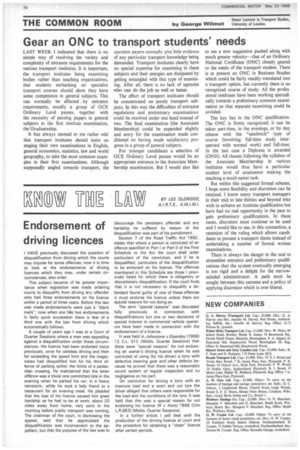Gear an ONC to transport students' needs
Page 78

If you've noticed an error in this article please click here to report it so we can fix it.
LAST WEEK I indicated that there is no simple way of resolving the variety and complexity of entrance requirements for the various transport institutes. It is important, the transport institutes being examining bodies rather than teaching organizations. that students embarking on specialist transport courses should show they have some competence in general subjects. This can normally be effected . by entrance requirements, usually a group of GCE Ordinary Level passes, together with the necessity of passing paws in general subjects in the first institute examination, the Graduateship.
It has always seemed to me rather odd that transport institutes should insist on staging their own examinations in English, general economics, statistics, law and world geography, to take the most common examples in their first examinations. Although supposedly angled towards transport, the question papers normally give little evidence of any particular transport knowledge being demanded. Transport institutes clearly have no special expertise for examining in these subjects and their energies are dissipated by getting entangled with this type of examining. After all, there is no lack of agencies who can do the job as well or better.
The effort of transport institutes should be concentrated on purely transport subjects. In this way the difficulties of entrance regulations and preliminary examinations could be resolved under one head instead of two. The final examination (the Associate Membership) could be expanded slightly and entry for the examination made conditional on having made satisfactory progress in a group of general subjects.
For younger candidates a selection of GCE Ordinary Level passes would be an appropriate entrance to the Associate Membership examination. But I would also like
to see a new suggestion pushed along with much greater velocity—that of an Ordinary National Certificate (ONC) closely geared to the needs of the transport student. There is at present an ONC in Business Studies which could be fairly readily translated into a transport option, but currently there is no recognized course of study. All the professional institutes have been working sporadically towards a preliminary common examination so that separate examining could be avoided.
The key lies in the ONC qualification. The ONC is firmly recognized; it can be taken part-time, in the evenings, or by day release with the "sandwich" type of course (involving full-time study interspersed with normal work) and full-time. In the last case a Diploma is awarded (OND). All classes following the syllabus of the Associate Membership in various institutes would thus have a particular student level of attainment making the teaching a much easier task.
But within this suggested formal scheme, I hope some flexibility and discretion can be retained. I know many transport managers in their mid to late thirties and beyond who wish to achieve an Institute qualification but have had no real opportunity in the past to gain preliminary qualifications. In these cases, discretion must continue to be used and I would like to see, in this connection, a retention of the ruling which allows candidates to present a transport thesis instead of undertaking a number of formal written examinations.
There is always the danger in the zeal to streamline entrance and preliminary qualifications that the system eventually emerging is too rigid and a delight for the narrowminded administrator. A path must be sought between this extreme and a policy of applying discretion which is over-liberal.
































































































































